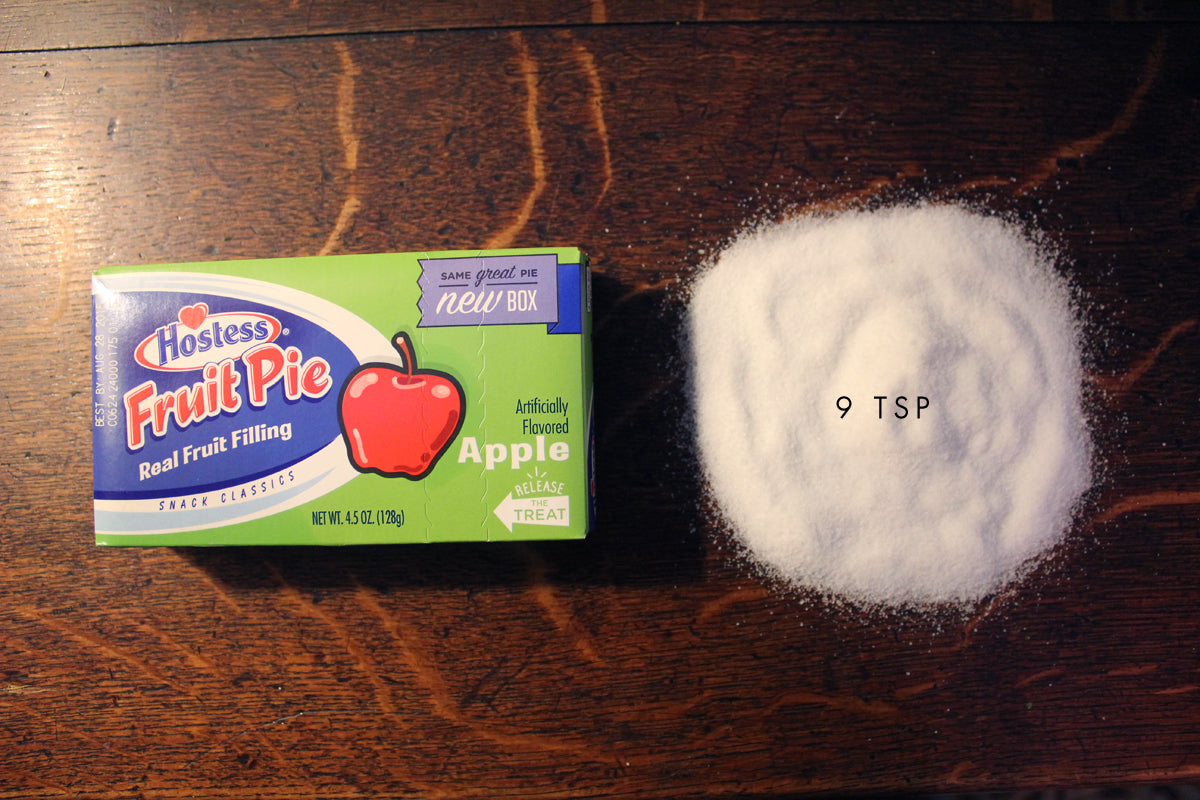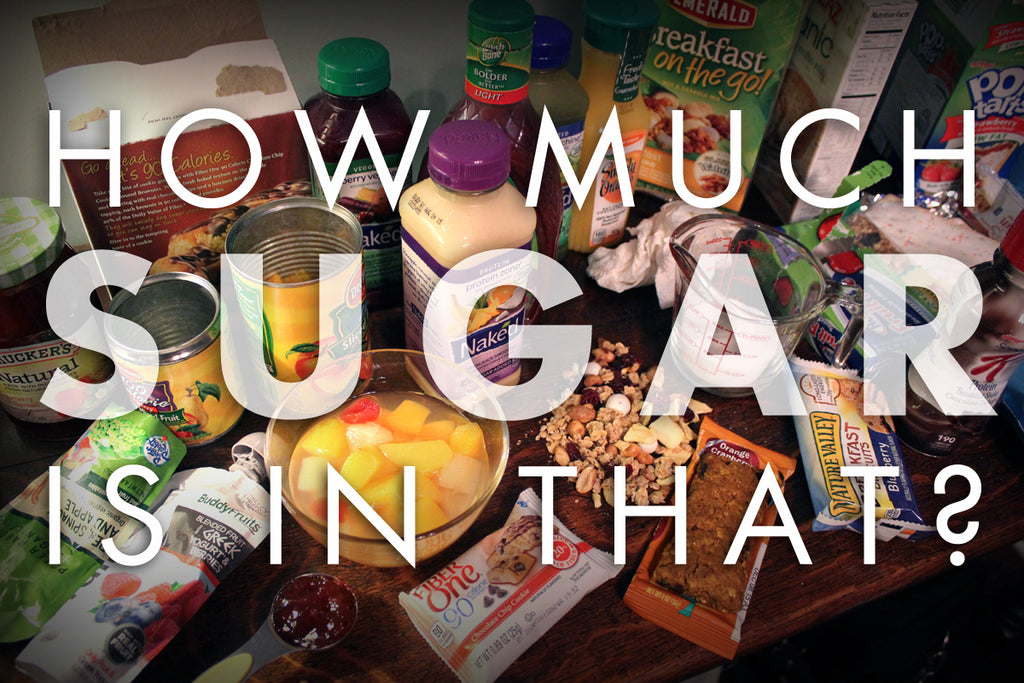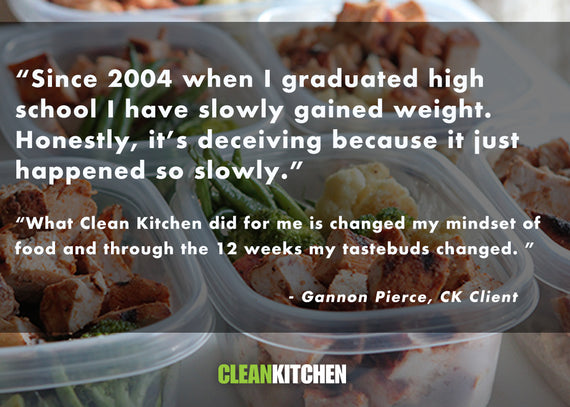But the package says "no added sugar" so it has got to be better for me!
Hold up right there. There is difference in reading food labels and food ingredients. The CK program teaches you how to read both. Just because the ads or packages say they are good for you, does not mean it's truthful. That's called advertising. Anyone who knows a thing or two about nutrition knows sugar is your worst enemy. Most prepackaged foods are loaded with it no matter what the food package claims. Even the "healthy" looking ones.You may be thinking now, "I just need to eat less calories."
The easiest way to count calories is to read a label. But do you know where those calories are coming from? Do you care? You should care, because that could be the reason you are not where you want to be. We do not count calories in Clean Kitchen. Real food does not have a nutrition label. First let me say this, yes, I acknowledge people do lose weight eating these food I have listed below. Whether or not that weight stays off or if these individuals are healthy is another thing. I do know this, there is only one path to health and fitness. Eat better quality foods (whole foods) and staying active. It is really that simple. Our mission for showing you this experiment is to help you realize the source of you calories matter a great deal. We do not live off of "calories." Our bodies require nutrients from whole foods to function and grow. Sugars have calories but offer absolutely zero nutrients. So you have to ask yourself, does this food make me healthy or not?On to the fun facts!
Sugar is one of the most commonly used food additives in America, improving the taste of foods and beverages and prolonging the shelf-life of processed food products. With the exception of salt, Americans consume 10 times more added sugar than any other food additive.American Heart Association Recommendations
Women should limit sugar intake to no more than 6 teaspoons per day, which provides about 100 calories. Men should limit sugar intake to no more than 9 teaspoons, or about 150 calories. In contrast, the average adult consumes 22 teaspoons per day. Now let's take a look at how the sugar adds up in some popular food items. Most of which either claim to be a healthier food by words or packaging design. They do however, give you the information of how much sugar and it's sources. But really, if you are not a dietician, why would you ever no how much is too much?Keep in mind, the only reason you would chose these foods would be to "be healthy," right? We will let you decide on how much these foods can add to your health.
There are two problems with most prepackaged "healthier" foods. 1: The packages make you believe you are buying something good for you. You read the food label with words like "natural, whole grain, light, low sugar, or no high fructose corn syrup" just to name a few. 2: In most cases, these foods have added sugar. And if it says "no added sugar" that could just mean they used "natural" source, like fruit concentrate, which is really just sugar. There are many, many, many different names of sugar that you probably can not even pronounce, much less recognize on an ingredients label. These foods sell convenience, not health. You need to understand no matter what the package claims, you can't always trust it.What we shopped for:
- Brands that advertise as a healthier option.
- Packaging that portrayed a healthier option with design and words.
- We checked the ingredients list. If it listed sugar, that means it was added.
4 grams of sugar = 1 teaspoon of sugar = 15 calories
"Light" dressings, but not so light on the sugar.
The Wishbone Light Raspberry Vinaigrette is 1 tsp (4 g) of sugar for every tablespoon of dressing.
 Seasoned steamer bags sometimes add sugar into their seasonings like this one.
Birds Eye Steam Fresh Asian Medley, 1 tsp (4g) of sugar for every cup of veggies. You could recreate this same mixture just as fast without the added sugar.
Seasoned steamer bags sometimes add sugar into their seasonings like this one.
Birds Eye Steam Fresh Asian Medley, 1 tsp (4g) of sugar for every cup of veggies. You could recreate this same mixture just as fast without the added sugar.
 Snacks foods that claim to be "healthy" are just ridiculous. No one ever got a ripped body by eating Fiber One Brownies. If you want fiber, eat some plants. One brownie has 2 tsp (8g) of sugar. Of those 90 calories, 30 calories are from sugar.
Snacks foods that claim to be "healthy" are just ridiculous. No one ever got a ripped body by eating Fiber One Brownies. If you want fiber, eat some plants. One brownie has 2 tsp (8g) of sugar. Of those 90 calories, 30 calories are from sugar.

 Again, always check those seasoned frozen veggie packs. Green Giant's Indian Spiced Lentils has 2.25 tsp (9g) of sugar for every cup.
Again, always check those seasoned frozen veggie packs. Green Giant's Indian Spiced Lentils has 2.25 tsp (9g) of sugar for every cup.


Yoplait Light yogurts do not have much nutritional value. But it does have 2.5 tsp of sugar! I have to stop myself from intervening people from loading their carts full of this stuff! I seriously gave a woman a lesson on reading sugar on labels while shopping for yogurt.
 Another trend in yogurt is greek yogurts. YOu really have to be aware of what you are buying. Lots are loaded with sugar, especially if they have the fruit mixed in. But this particular one, Yoplait Whips Greek, is lower than most, but advertises "100 calories." It has 3 tsp (12g/45 cal) of sugar. I compared Yoplait to their competitor, Danon Light and Fit Greek has 1.75 tsp (7 g/26.25 cal).
Another trend in yogurt is greek yogurts. YOu really have to be aware of what you are buying. Lots are loaded with sugar, especially if they have the fruit mixed in. But this particular one, Yoplait Whips Greek, is lower than most, but advertises "100 calories." It has 3 tsp (12g/45 cal) of sugar. I compared Yoplait to their competitor, Danon Light and Fit Greek has 1.75 tsp (7 g/26.25 cal).

 Fruit spreads are just plain sugar. Smuckers "Natural" fruit spread has 2.5 tsp (10g) of sugar for every tablespoon of jam. Regardless of its "natural" sources, your body can not tell the difference. Sugar is just sugar.
Fruit spreads are just plain sugar. Smuckers "Natural" fruit spread has 2.5 tsp (10g) of sugar for every tablespoon of jam. Regardless of its "natural" sources, your body can not tell the difference. Sugar is just sugar.

 Oh the frozen dinners! We did find a few that were not too bad in the sugar, but still most had added sugar components. Lean Cuisine Sweet Siracha Braised Beef has 2.75 tsp (11g) of sugar in one dinner. Most likely it is from the sauce.
Oh the frozen dinners! We did find a few that were not too bad in the sugar, but still most had added sugar components. Lean Cuisine Sweet Siracha Braised Beef has 2.75 tsp (11g) of sugar in one dinner. Most likely it is from the sauce.


Healthy Choice Kung Pao Chicken has 2.75 tsp (11 g) of sugar in one meal, again probably the sauce is the main culprit. You would be much better off eating the CK Kung Pao chicken recipe with only 2 grams of sugar per serving!


The Healthy Choice Golden Roasted Turkey Breast has 4 tsp (16g) of sugar per meal. This is probably due to the cherry blueberry dessert...but why do you need dessert in a "healthy" meal?

 Granola! So sneaky and soooo loaded with sugar. This little bar has 3 tsp (12g) of sugar...and so does 1/2 of a Snickers bar.
Granola! So sneaky and soooo loaded with sugar. This little bar has 3 tsp (12g) of sugar...and so does 1/2 of a Snickers bar.

Nature Valley Breakfast Biscuits advertise "long lasting energy," but with the lack of protein and fat, and the high amount of sugar, 3 tsp (12g) for every pack, these biscuits will only send you on a sugar crash and hungry shortly after. They call them biscuits, but it's really just a cookie.


"Lite" canned fruit just sits in a watered down version of the original sugar water, mixed with some artificial sweeteners. Del Monte "Lite" Sliced peaches have 3.25 tsp (13g) of sugar every 1/2 cupped drained, 6.5 tsp (26g) of sugar for every cup drained. Just eat a fresh peach with half the sugar, no artificial sweeteners and more fiber!

 Pureed fruit are super easy for kids and super sweet, that's why they taste good. But you may want to rethink handing those out. Buddy Fruits Greek Yogurt and Berries is like pouring 3.25 tsp (13g) of sugar in their mouths.
Pureed fruit are super easy for kids and super sweet, that's why they taste good. But you may want to rethink handing those out. Buddy Fruits Greek Yogurt and Berries is like pouring 3.25 tsp (13g) of sugar in their mouths.

Here's another pureed fruit and veggie mix, Peter Rabbit Organics Pea, Spinach and Apple, 4 tsp of sugar!

Honestly, I think these type of desserts are just a tease and keep you wanting more. Break the cycle! Weight Watchers Smart Ones Peanut Butter Cup Sundae packs 3.25 tsp (13 g) of sugar in this itty-bitty 2.4 ounce serving...that's a serving little over a 1/4 cup.

 Special K brand probably infuriates me the most because they really push the whole "eat less to lose weight" and their foods are simply empty calories. We counted multiple sugars listed in the ingredients list. We also found it has "partially hydrogenated palm kernel oil" which means there is trans fat in the product. One "meal bar" has 3.5 tsp (14g/52.5 cal) of sugar.
Special K brand probably infuriates me the most because they really push the whole "eat less to lose weight" and their foods are simply empty calories. We counted multiple sugars listed in the ingredients list. We also found it has "partially hydrogenated palm kernel oil" which means there is trans fat in the product. One "meal bar" has 3.5 tsp (14g/52.5 cal) of sugar.

 Muffins are just another name for cake. Kruteaz Organic Whole Grain Muffin Mix has 3.5 tsp (14g/52.5 cal) of sugar per 1/4 cup, which is 1 muffin. That does not include the milk you need to mix with it.
Muffins are just another name for cake. Kruteaz Organic Whole Grain Muffin Mix has 3.5 tsp (14g/52.5 cal) of sugar per 1/4 cup, which is 1 muffin. That does not include the milk you need to mix with it.

Dried fruits are like candy! These "Reduced Sugar" Dried Cranberries STILL list added sugar in the ingredients list! You get 3.5 tsp (14g) for every 1/4 cup of reduced sugar cranberries.


The Odwalla "Nourishing Bar" Orange Cranberry is more like a candy bar. It has 4.5 tsp (18g/67.5 cal) of sugar per bar. They advertise "real fruit and whole grains."
 Another gem from Special K! The Special K Protein Shake gives you 4.5 tsp (18g/67.5 cal) of sugar per bottle and barely enough protein (10 g) to be labeled a legit serving in my book.
Another gem from Special K! The Special K Protein Shake gives you 4.5 tsp (18g/67.5 cal) of sugar per bottle and barely enough protein (10 g) to be labeled a legit serving in my book.
 Here's another advertiser of "breakfast" meals, but it is merely candy. Emerald Breakfast On The Go Nut Blend gives you 4.75 tsp (19g/71.25 cal) of sugar per packet. You would do better just grab some of Emerald's Almonds and go!
Here's another advertiser of "breakfast" meals, but it is merely candy. Emerald Breakfast On The Go Nut Blend gives you 4.75 tsp (19g/71.25 cal) of sugar per packet. You would do better just grab some of Emerald's Almonds and go!

 More canned fruit, but this time it advertises only 100 calories! One can of 100 Calorie Chunky Mixed Fruit (Cherry) has 5.5 tsp (22 g) of sugar. So that means 82.5 calories come from sugar! The source of the calories matter!
More canned fruit, but this time it advertises only 100 calories! One can of 100 Calorie Chunky Mixed Fruit (Cherry) has 5.5 tsp (22 g) of sugar. So that means 82.5 calories come from sugar! The source of the calories matter!

 Before we get to our next section, I wanted to show a true snack-junk food. This advertises using "real fruit filling" but most people would make no mistake when buying this. You would know you are eating junk. The Hostess Fruit Apple Pie has 9 tsp (36g/135 cal) of sugar per pie. Keep that in mind as we continue!
Before we get to our next section, I wanted to show a true snack-junk food. This advertises using "real fruit filling" but most people would make no mistake when buying this. You would know you are eating junk. The Hostess Fruit Apple Pie has 9 tsp (36g/135 cal) of sugar per pie. Keep that in mind as we continue!


Moving onto fruit juices!
At Clean Kitchen we do not drink fruit juices. We do not want to drink our calories, so staying away from juices is our philosophy. I know, I know, some of you may "juice" or do a cleanse, but that is not our thing. We like to eat solids that fill us up so we do not get cranky. You can not live off of juice forever... The following juices look like they are in the "healthy" club. I will give them credit, the ingredients list does not list anything weird, but the amount of sugar found in these is outrageous. The labels say "no added sugar," and that's a blessing or you might go into a diabetic coma. Naked Juice Berry Veggie is a little sneaky. This bottle list "about 2 servings" per bottle. This advertises the equivalent of 1 pound of vegetables in one bottle. That is insane. Maybe that is why it is split into two servings? One serving is 4.5 tsp (18g/67.5 cal) of sugar per 8 oz. I had to add up the real amount which came to 8.55 tsp (35.2 g/128.25 cal) of sugar per 15.2 oz bottle. Over half the calories are coming from sugar. Naked Juice Green Machine is a doozy with 13.25 tsp (53g/198.75 cal) of sugar! And you probably thought you were doing so good getting in all that green! oopsies!
Naked Juice Green Machine is a doozy with 13.25 tsp (53g/198.75 cal) of sugar! And you probably thought you were doing so good getting in all that green! oopsies!
 Naked Juice Protein Zone isn't much better, but at least it has protein. One 15.2 oz bottle has 13.3 tsp (53.2g/199.5 cal) of sugar.
Naked Juice Protein Zone isn't much better, but at least it has protein. One 15.2 oz bottle has 13.3 tsp (53.2g/199.5 cal) of sugar.
 Last but not least is good ole OJ. I know it was probably your go to healthy breakfast, but this 11.5 oz bottle gives you 8.25 tsp (33g/123.75) of sugar.
Last but not least is good ole OJ. I know it was probably your go to healthy breakfast, but this 11.5 oz bottle gives you 8.25 tsp (33g/123.75) of sugar.




